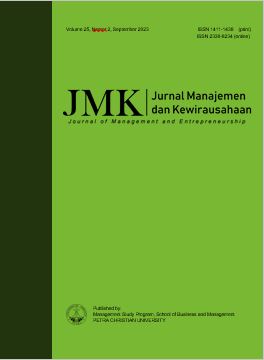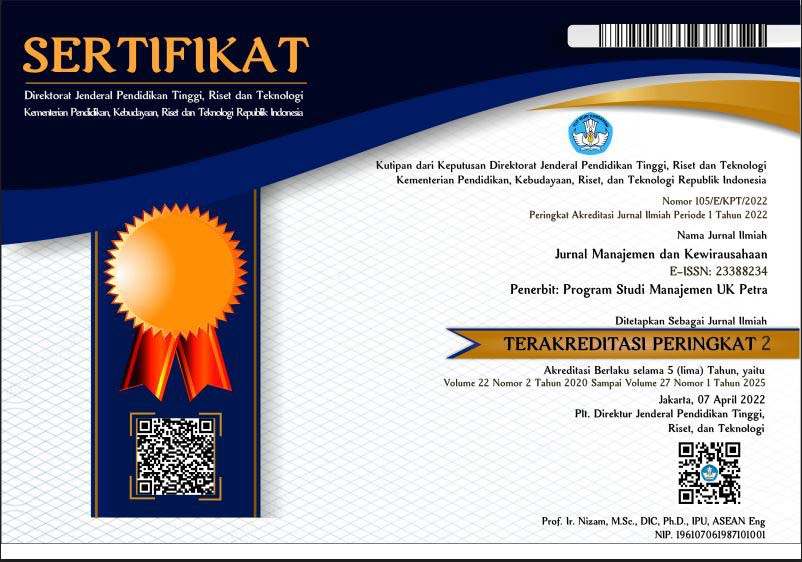EMPLOYEE PERFORMANCE: THE MODERATING ROLE OF LEADER-MEMBER EXCHANGE (A STUDY ON THE FAST-FASHION RETAIL INDUSTRY)
 :
:
https://doi.org/10.9744/jmk.25.2.131-141
Keywords:
Counterproductive work behavior, employee performance, leader-member exchange, organizational citizenship behavior, job satisfactionAbstract
This study investigated the knowledge gap in the retail sector by exploring the relationship between job satisfaction, counterproductive work behavior, and organizational citizenship behavior on employee performance moderated by leader-member exchange. The quantitative study used a survey method to collect data with purposive sampling and technique. The survey was conducted on 150 employees from 17 Jakarta, Bogor, Depok, Tangerang, and Bekasi (JABODETABEK) outlets. The data was analyzed using the structural equation modeling partial least square technique processed with smart-pls 3.3.3 tools. The study's findings were as follows: job satisfaction negatively and significantly affected counterproductive work behavior, counterproductive work behavior affected organizational citizenship behavior, and organizational citizenship behavior positively and significantly affected employee performance. In the meantime, leader-member exchange moderated job satisfaction's effect on counterproductive work behavior and employee performance but did not moderate counterproductive work behavior's effect on organizational citizenship behavior. The research had novelty from the aspect of a specific sample characteristic: the employees of the fast-fashion retail. It used a conceptual framework that combined theories of job satisfaction, counterproductive work behavior, organizational citizenship behavior, and leader-member exchange to explain employee performance, which had never been done in previous studies in the fast-fashion retail context.
References
Audenaert, M., Decramer, A., George, B., Verschuere, B., & Van Waeyenberg, T. (2019). When employee performance management affects individual innovation in public organizations: The role of consistency and LMX. International Journal of Human Resource Management, 30(5), 815–834. https://doi.org/10.1080/09585192.2016.1239220
Becton, J. B., Carr, J. C., Mossholder, K. W., & Walker, H. J. (2017). Differential effects of task performance, organizational citizenship behavior, and job complexity on voluntary turnover. Journal of Business and Psychology, 32(4), 495–508. https://doi.org/10.1007/s10869-016-9461-x
Bennett, R. J., & Robinson, S. L. (2000). Development of a measure of workplace deviance. Journal of Applied Psychology, 85(3), 349–360. https://doi.org/10.I037//0021-9010.85.3.349
Bohle, S. L., Bal, P. M., Jansen, P. G. W., Leiva, P. I., & Alonso, A. M. (2017). How mass layoffs are related to lower job performance and OCB among surviving employees in Chile: An investigation of the essential role of psychological contract. International Journal of Human Resource Management, 28 (20), 2837–2860. https://doi.org/10.1080/09585192.2016.1138988
Buttkus, M., & Eberenz, R. (2019). Performance management in retail and the consumer goods industry: Best practices and case studies. Springer. https://doi.org/10.1007/978-3-030-12730-5
Capitano, J., & Cunningham, Q. W. (2018). Suspicion at work: The impact on counterproductive and citizenship behaviors. Organization Management Journal, 15(4), 174–185. https://doi.org/10.1080/15416518.2018.1528858
Cek, K., & Eyupoglu, S. Z. (2019). Does teachers’ perceived corporate social responsibility lead to organisational citizenship behaviour? The mediating roles of job satisfaction and organisational identification. South African Journal of Business Management, 50(1), a1481. https://doi.org/10.4102/sajbm.v50i1.1481
Chin, W. W. (1998). The partial least squares approach for structural equation modeling. In G. A. Marcoulides (Ed.), Modern methods for business research (pp. 295–336). Mahwah, NJ: Lawrence Erlbaum Associates.
Czarnota-Bojarska, J. (2015). Counterproductive work behavior and job satisfaction: A surprisingly rocky relationship. Journal of Management and Organization, 21(4), 460–470. https://doi.org/10.1017/jmo.2015.15
Dessler, G., & Varkkey, B. (2020). Human resource management. 16th Edition. Pearson Education.
Di Stefano, G., Venza, G., & Aiello, D. (2020). Associations of job insecurity with perceived work-related symptoms, job satisfaction, and turnover intentions: The mediating role of leader–member exchange and the moderating role of organizational support. Frontiers in Psychology, 11. https://doi.org/10.3389/fpsyg.2020.01329
González-Navarro, P., Zurriaga-Llorens, R., Olateju, A. T., & Llinares-Insa, L. I. (2018). Envy and counterproductive work behavior: The moderation role of leadership in public and private organizations. International Journal of Environmental Research and Public Health, 15(7), 1455. https://doi.org/10.3390/ijerph15071455
Graen, G. B., & Uhl-Bien, M. (1995). Relationship-based approach to leadership: Development of leader-member exchange (LMX) theory of leadership over 25 years: Applying a multi-level domain perspective. Leadership Quartely, 6(2), 219–247. https://doi/10.1016/1048-9843(95)90036-5
Graves, L. M., & Luciano, M. M. (2010). Effects of LMX on employee attitudes: The role of need satisfaction and autonomous motivation. Paper presented at 70th Annual Meeting of the Academy of Management - Dare to Care: Passion and Compassion in Management Practice and Research, AOM 2010, Montreal, QC, Canada. https://doi.org/10.5465/ambpp.2010.54493902
Griep, Y., & Vantilborgh, T. (2018). Reciprocal effects of psychological contract breach on counter-productive and organizational citizenship behaviors: The role of time. Journal of Vocational Behavior, 104, 141–153. https://doi.org/10.1016/j.jvb.2017.10.013
Hair, J. F., Hult, G. T. M., Ringle, C. M., & Sarstedt, M. (2016). A primer on partial least squares structural equation modeling (PLS-SEM). 2nd Edition. SAGE Publications Inc.
Harris, T. B., Li, N., & Kirkman, B. L. (2014). Leader-member exchange (LMX) in context: How LMX differentiation and LMX relational separation attenuate LMX’s influence on OCB and turnover intention. Leadership Quarterly, 25(2), 314–328. https://doi.org/10.1016/j.leaqua.2013.09.001
Hoppock, R. (1935). Job satisfaction. Oxford, UK: Harper.
Jawahar, I. M., & Stone, T. H. (2017). Do career satisfaction and support mediate the effects of justice on organizational citizenship behaviour and counterproductive work behaviour? Canadian Journal of Administrative Sciences, 34(3), 215–228. https://doi.org/10.1002/cjas.1350
Judge, T. A., Heller, D., & Mount, M. K. (2002). Fivefactor model of personality and job satisfaction: A meta-analysis. Journal of Applied Psychology, 87(3), 530–541. https://doi.org/10.1037/0021-9010.87.3.530
Khan, M. A., Ismail, F. B., Hussain, A., & Algha¬zali, B. (2020). The interplay of leadership styles, innovative work behavior, organizational culture, and organizational citizenship behavior. SAGE Open. https://doi.org/10.1177/215824401989 8264
Kim, M. S., & Koo, D. W. (2017). Linking LMX, engagement, innovative behavior, and job performance in hotel employees. International Journal of Contemporary Hospitality Management, 29(12), 3044–3062. https://doi.org/10.1108/IJCHM-06-2016-0319
Kinicki, A. J., Mckee-Ryan, F. M., Schriesheim, C. A., & Carson, K. P. (2002). Assessing the construct validity of the job descriptive index: A review and meta-analysis. The Journal of Applied Psychology, 87(1), 14–32. https://doi.org/10.1037/0021-9010.87.1.14
Koopmans, L., Bernaards, C. M., Hildebrandt, V. H., De Vet, H. C. W., & Van Der Beek, A. J. (2014). Measuring individual work performance: Identifying and selecting indicators. Work, 48(2), 229–238. https://doi.org/10.32 33/WOR-131659
Lebrón, M., Tabak, F., Shkoler, O., & Rabenu, E. (2018). Counterproductive work behaviors toward organization and leader-member exchange: The mediating roles of emotional exhaustion and work engagement. Organization Management Journal, 15(4), 159–173. https://doi.org/10.1080/15416518.2018 .1528857
Machova, R., Zsigmond, T., Zsigmondova, A., & Seben, Z. (2022). Employee satisfaction and motivation of retail store employees. Marketing and Management of Innovations, 1(1), 67–83. https://doi.org/10.21272/mmi.2022.1-05
Mercado, B. K., & Dilchert, S. (2017). Family interference with work and its relationship with organizational citizenship and counterproductive work behaviors. International Journal of Selection and Assessment, 25(4), 406–415. https://doi.org/10.1111/ijsa.12195
Nemteanu, M. S., & Dabija, D. C. (2021). The influence of internal marketing and job satisfaction on task performance and counterproductive work behavior in an emerging marketing during the covid-19 pandemic. International Journal of Environmental Research and Public Health, 18(7), 3670. https://doi.org/10.3390/ijerph18073670
Newman, A., Schwarz, G., Cooper, B., & Sen¬djaya, S. (2017). How servant leadership influences organizational citizenship behavior: The roles of LMX, empowerment, and proactive personality. Journal of Business Ethics, 145, 49–62. https://doi.org/10.1007/s10551-015-2827-6
Newton, C., & Perlow, R. (2021). The role of leader-member exchange relations and individual differences on counterproductive work behavior. In Psychological Reports. SAGE Publications Inc. https://doi.org/10.1177/00 33294121989298
Ofei-Dodoo, S., Scripter, C., Kellerman, R., Haynes, C., Marquise, M. E., & Bachman, C. S. (2018). Burnout and job satisfaction among family medicine residency coordinators: Results from a national survey. Family Medicine, 50(9), 679–684. https://doi.org/10.22454/FamMed.2018.921094
Parker-Strak, R., Barnes, L., Studd, R., & Doyle, S. (2020). Disruptive product development for online fast fashion retailers. Journal of Fashion Marketing and Management, 24(3), 517–532. https://doi.org/10.1108/JFMM-08-2019-0170
Pei, X. L., Guo, J. N., Wu, T. J., Zhou, W. X., & Yeh, S. P. (2020). Does the effect of customer experience on customer satisfaction create a sustainable competitive advantage? A comparative study of different shopping situations. Sustainability, 12(18), 7436. https://doi.org/10.3390/SU12187436
Reb, J., Chaturvedi, S., Narayanan, J., & Kudesia, R. S. (2019). Leader mindfulness and employee performance: A sequential mediation model of LMX quality, interpersonal justice, and employee stress. Journal of Business Ethics, 160(3), 745–763. https://doi.org/10.1007/s10551-018-3927-x
Schuler, R. S., & Jackson, S. E. (1987). Linking competitive strategies with human resource management practices. Academy of Management Perspectives, 1(3), 207–219. https://doi.org/10.5465/ame.1987.4275740
Shanker, M. (2018). Organizational citizenship behavior in relation to employees’ intention to stay in Indian organizations. Business Process Management Journal, 24(6), 1355–1366. https://doi. org/10.1108/BPMJ-02-2018-0048
Shao, D., Zhou, E., Gao, P., Long, L., & Xiong, J. (2019). Double-edged effects of socially responsible human resource management on employee task performance and organizational citizenship behavior: Mediating by role ambiguity and moderating by prosocial motivation. Sustainability, 11(8), 2271. https://doi.org/10.3390/su11082271
Shin, Y., Hur, W. M., Moon, T. W., & Lee, S. (2019). A motivational perspective on job insecurity: Relationships between job insecurity, intrinsic motivation, and performance and behavioral outcomes. International Journal of Environmental Research and Public Health, 16(10), 1812. https://doi.org/10.3390/ijerph16101812
Spector, P. E. (2011). The relationship of personality to counterproductive work behavior (CWB): An integration of perspectives. Human Resource Management Review, 21(4), 342–352. https://doi. org/10.1016/j.hrmr.2010.10.002
Staw, B. M., & Ross, J. (1985). Stability in the midst of change: A dispositional approach to job attitudes. Journal of Applied Psychology, 70(3), 469–480. https://doi/10.1037/0021-9010.70.3.469
Sugianingrat, I. A. P. W., Widyawati, S. R., da Costa, C. A. de J., Ximenes, M., Piedade, S. D. R., & Sarmawa, W. G. (2019). The employee engagement and OCB as mediating on employee performance. International Journal of Productivity and Performance Management, 68(2), 319–339. https://doi.org/10.1108/IJPPM-03-2018-0124
Szostek, D. (2017). Counterproductive work behaviours in an organization and their measurement upon the example of research conducted among employees in the public administration sector in Poland. Handel Wewnetrzny, 4(369), 169–179.
Zhang, L., & Deng, Y. (2016). Guanxi with supervisor and counterproductive work behavior: The mediating role of job satisfaction. Journal of Business Ethics, 134(3), 413–427. https://doi.org/10.1007/s10551-014-2438-7
Downloads
Published
How to Cite
Issue
Section
License
Authors who publish on this journal agree to the following terms:
- Authors retain copyright and grant the journal right of first publication with the work simultaneously licensed under a Creative Commons Attribution License that allows others to share the work with an acknowledgement of the work's authorship and initial publication in this journal.
- Authors are able to enter into separate, additional contractual arrangements for the non-exclusive distribution of the journal's published version of the work (e.g., post it to an institutional repository or publish it in a book), with an acknowledgement of its initial publication in this journal.
- Authors are permitted and encouraged to post their work online (e.g., in institutional repositories or on their website) prior to and during the submission process, as it can lead to productive exchanges, as well as earlier and greater citation of published work (See The Effect of Open Access).


















